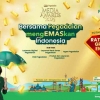Quantitative and qualitative research are two main approaches in social and educational studies. Quantitative research is grounded in the positivist paradigm, which emphasizes objectivity, numerical measurement, and the relationship between variables. In contrast, qualitative research is based on the constructivist paradigm, which focuses on meaning, experience, and social interaction. Although they have fundamental differences in methodology, both approaches complement each other in providing a more comprehensive understanding of phenomena.
The research problem becomes the starting point that greatly determines the direction of a study. The chosen problem must be clear, specific, relevant, and methodologically testable. From the research problem arises the concept, which is explained through a conceptual definition (theory-based) as well as an operational definition (indicator-based and measurable). The close relationship between the problem and the concept ensures that the research goes beyond mere description and instead has a strong theoretical foundation, thereby contributing scientifically.
Furthermore, a construct represents an abstract phenomenon that cannot be directly measured, such as motivation or leadership. To make a construct researchable, indicators are used as measurable variables that represent the construct. These indicators are then operationalized through research instruments such as questionnaires, scales, or interview guidelines. The validity of indicators is crucial as it ensures alignment between empirical data and the intended meaning of the construct under study.
Phenomena observed by researchers are manifested in the form of data, whether in numbers (quantitative) or narratives (qualitative). In the quantitative approach, phenomena are analyzed through variables that can act as independent, dependent, mediating, moderating, or control variables. The appropriate selection of variables and measurement scales---nominal, ordinal, interval, or ratio---greatly determines the quality of the research. This strongly influences the accuracy of data interpretation and research conclusions, ensuring that the findings are scientifically accountable.
In conclusion, both quantitative and qualitative research are equally important in enriching the understanding of phenomena. Quantitative research focuses on objectivity and generalization, while qualitative research emphasizes meaning and social context. By formulating clear problems, building precise concepts, and operationalizing constructs through valid indicators, research can generate findings that are relevant, accurate, and beneficial for the advancement of knowledge.
This essay is a review of Part V (Paradigm, Axioms, and Special Concepts of Quantitative and Qualitative Research) from the course material of Research Methods in Management, taught by Prof. Dr. H. A Rusdiana, M.M. https://eknows.uinsgd.ac.id/mod/assign/view.php?id=302586
Abilio Sesar was born in Tasikmalaya on November 21, 2004. He is the second child of Mr. Sohib and Mrs. Rusniati.
Address: Kp. Cikatulampa, Cipatujah District.
Phone: 081214241701 | Email: sesarabilio21@gmail.com
Motto: "Die to Live."
Follow Instagram @kompasianacom juga Tiktok @kompasiana biar nggak ketinggalan event seru komunitas dan tips dapat cuan dari Kompasiana. Baca juga cerita inspiratif langsung dari smartphone kamu dengan bergabung di WhatsApp Channel Kompasiana di SINI







